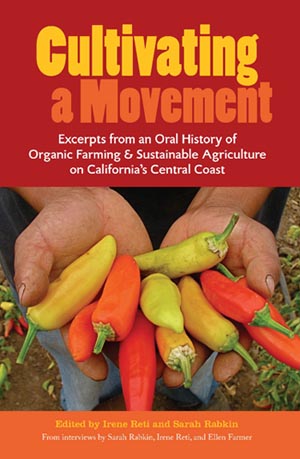A new book published by the UCSC Library’s Regional History Project offers a sparkling window into the 40-year history of how UC Santa Cruz--and California’s Central Coast—became leaders in the organic farming and sustainable agriculture movement.
The 340-page paperback anthology is a collection of 29 stories drawn from a larger archive of oral histories collected by the Regional History Project in 2010.
It documents a dynamic community of farmers, researchers, activists, and educators, who speak for themselves about the transformative movement that emerged in the late 1960’s on the California coast.
Titled Cultivating a Movement: An Oral History of Organic Farming and Sustainable Agriculture on California’s Central Coast, the book focuses primarily on developments in Santa Cruz, Monterey, San Benito, San Mateo and Santa Clara counties.
However, many of the interviewees have gone on to influence sustainable food policy on both the national and international level.
As food policy expert, chair of the Nutrition Education Program at Columbia University, and beloved garden writer Joan Dye Gussow, whom the New York Times called “matriarch of the eat-locally-think-globally food movement,” notes:
“If you find yourself depressed about the possibilities for positive change, pick up Cultivating a Movement and read a few stories told by people who have been devoting their lives to creating a sustainable food system in the heartland of agribusiness.”
Cultivating a Movement features people like Mark Lipson, who was the first paid staff member for California Certified Organic Farmers (CCOF)--one of the first organizations to perform organic certification in North America.
CCOF and Lipson worked with then-Assembly member Sam Farr to pass the 1990 California Organic Foods Act, which established standards for organic food production and sales in California. Those standards later became the basis for the federal National Organic Program.
Lipson is now the Organic and Sustainable Agriculture Policy Advisor for the United States Department of Agriculture.
The book also includes Jim Cochran, who founded Swanton Berry Farm on the North Coast of Santa Cruz County, becoming the first commercial organic strawberry grower in the United States.
Cochran researched organic growing methods with UCSC professor of agroecology Steve Gliessman, noting in his oral history how he “went back to good, old-fashioned farming practices, which are crop rotation and adding good soil amendments. Managing soil disease was a problem that Steve Gliessman and I worked out, looking at some of the old literature and coming up with the notion that Brassica families—plants like broccoli or Brussels sprouts or mustards—might help suppress soil disease.”
Today, Cochran is an important resource in the current controversy over industrial agriculture’s use of methyl iodide on strawberries and other crops.
Gliessman is now an internationally recognized leader in the field of agroecology and founding director of the Center for Agroecology and Sustainable Food Systems.
Cultivating a Movement also features interviews with Tim Galarneau, who spearheaded the movement to transform dining services at UCSC to emphasize local, organic food; UCSC’s Chadwick Garden manager Orin Martin, who is widely known for his skills as a master orchardist, teacher, and horticulturalist; and UCSC’s CASFS director Patricia Allen, one of the nation’s most prominent scholars on the social aspects of food production, distribution, and access.
The volume also spotlights the latest generation of farmers such as Cynthia Sandberg, cultivator for Iron Chef David Kinch’s Manresa Restaurant in Los Gatos, and Maria Inés Catalan, the first Latina migrant farm worker to own and operate a certified organic farm in California.
Irene Reti--director of the UCSC Library’s Regional History Project and co-editor of Cultivating a Movement with UCSC writing and environmental studies lecturer Sarah Rabkin--said she hopes her new book will “not only be read by the growing number of Americans involved in the local and organic food movements, but also studied in college classes in agroecology, organic farming, and the history of social movements.”
A reading for the book will be held at Bookshop Santa Cruz on February 22, from 7 to 8:30 p.m. Admission is free.
The complete archive of transcripts, audio clips, photographs, and other resources from the larger oral history series is available on the UCSC Library’s website .
New book traces UCSC’s role in organic and sustainable farm movement
Reading to celebrate book published by UCSC Library’s Regional History Project at Bookshop Santa Cruz on Feb. 22




